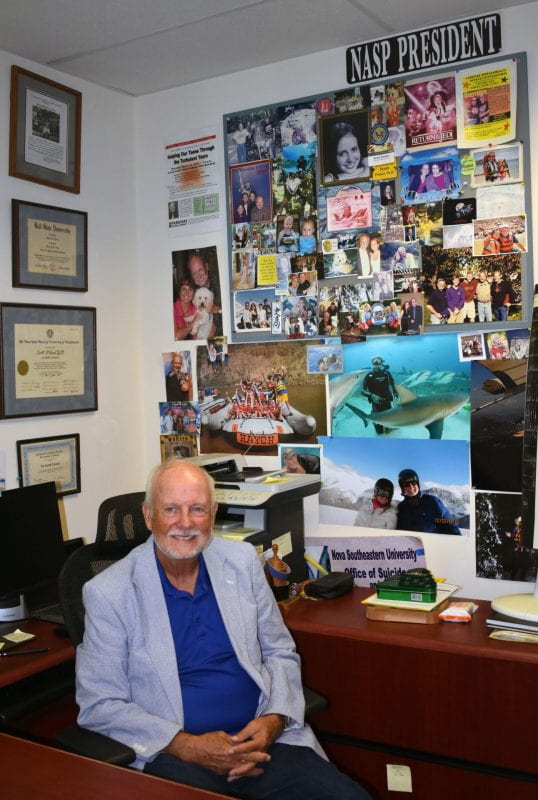
Scott Poland, Ed.D., a professor at Nova Southeastern University’s College of Psychology and the director of NSU’s Suicide and Violence Prevention Office
On April 20, 1999, a tragic event at Columbine High School in Colorado sent shockwaves across the nation when two students stormed the school with weapons, killing 12 students, one teacher, and wounding more than 20 others before committing suicide. Decades since that senseless tragedy, there have been seemingly countless school shootings and mass shootings in the United States.
Columbine, and many subsequent tragedies, stick clearly in the mind of Scott Poland, Ed.D., a professor at Nova Southeastern University’s College of Psychology and the director of NSU’s Suicide and Violence Prevention Office. It has been his life’s pursuit to help families, students, and the public understand and cope during these terrifying ordeals. You could say Poland is “ground zero” when it comes to expertise on this issue.
“My estimate is that I’ve now done more than 1,000 interviews on the subject of school shootings and have appeared on every major news program,” he said.
At Columbine, Poland led a national team and appeared on “Good Morning America,” interviewed by award-winning TV journalist Barbara Walters.
“Her first question was, ‘Dr. Poland, don’t you think the school shootings are because of the massive size of the high schools in this country?’ My response was, ‘That’s an interesting question, but I think the most important things to share this morning are all the support being provided to staff, students, and parents in the Columbine community.’”
Since that interview, Poland has responded and led crisis intervention efforts after 17 school shootings – the most recent being the shooting at Burke Private School in Washington, D.C., in April of this year after a gunman shot up a school injuring one child and three adults.
Poland previously received the Helping Parkland Heal Award from the City of Parkland in South Florida. In the Parkland shooting in 2018, a 19-year-old opened fire at Marjory Stoneman Douglas High School, killing 17 people and wounding 17 others.
Poland’s career has been paved in crisis, a small word with enormous implications.
He grew up in the rural town Lyons, Kansas. His mother was a secretary and his father worked in the oil fields. His mother had a high school diploma, but his father dropped out of high school, eventually enlisting in the Marines the day after the attack on Pearl Harbor. His father saw action in the South Pacific, and upon returning from war, he would never be the same – racked with depression and alcoholism.
Poland and his older brother and sole sibling were the first in his family to attend college. Poland chose accounting at the University of Kansas, but it didn’t choose him.
“I was kicked out for poor scholarship,” he said. “Accounting was not my calling.”
Poland was then drafted in the Vietnam War, where he was trained as a medic. As fortune would have it, his orders for Vietnam were canceled and he served two years attached to an outfit in Colorado.
After discharge from the Army, Poland worked as an attendant at a large psychiatric hospital in Connecticut. At the hospital, Poland became inspired to go back to college and study psychology in hopes of providing better care than what he observed.
With the G.I. Bill, Poland got his bachelor’s degree in psychology at Arizona State University and moved to Indiana where he earned his master’s in counseling at Ball State University. Around that time, Poland says, he faced one of the most significant events of his life: the suicide of his father.
“I wish that I had known then all the things that I know now about the importance of not being afraid to ask someone if they are thinking of suicide,” he said. “My father exhibited very definite warning signs and I should’ve recognized the warning signs and asked him directly about suicide. I believe he would’ve answered ‘yes’ and then I would’ve known to take action to keep him safe.”
His father’s passing further steered Poland down the road to helping others as a counselor at a private boys’ school and he also became a Big Brother – now 48 years and counting. The school was marred by “abusive situations,” he says, which led to his resignation, and an investigation eventually closed the school. Poland landed a job as mental health administrator at a state hospital with severely developmentally disabled adults. When his ideas on increasing the quality of life for the residents were met with “considerable resistance,” he said, it was time to leave the hospital.
Poland went back to Ball State and received his doctorate degree in school psychology before working as a psychologist for the Cypress-Fairbanks Independent School District in Texas. With student suicides on the rise in the district, it became his job to find solutions.
“That was 41 years ago, and I have made youth suicide prevention my highest priority,” he said. “I am the author and co-author of six books about school crisis. I have authored or co-authored every National Association of School Psychologists best practice chapter on suicide prevention in schools for nearly four decades.”

Poland has also co-authored three state school suicide prevention plans for Texas, Montana, and Florida. He recently received a Florida Blue Foundation Grant to provide training around the state on the School Toolkit for Educators to Prevent Suicide (STEPS) over the next three years.
Poland has also co-authored three state school suicide prevention plans for Texas, Montana, and Florida. He recently received a Florida Blue Foundation Grant to provide training around the state on the School Toolkit for Educators to Prevent Suicide (STEPS) over the next three years.
Poland became well-known for his expertise, serving on a national crisis team that went to Oklahoma immediately after the Oklahoma City bombing to provide support for the schools there.
“I suggested that the National Association of School Psychologists form a crisis team to provide intervention and training to schools around the nation affected by school shootings,” he said. “The National Emergency Assistance Team (NEAT) was formed in which I was the initial chairman … and led national crisis teams invited to numerous school communities including Columbine after school shootings there. I received my first of four requests to provide testimony before the U.S. Congress about school violence and/or suicide in 1999.”
Poland’s most recent book on the subject, “Lessons Learned from School Shootings: Perspectives from the United States,” was co-authored with Sara Ferguson, a graduate of NSU’s clinical program in the College of Psychology. It was published in 2021.
After 26 years working full-time as a school psychologist, Poland was offered a faculty position at NSU, where he oversees the Suicide and Violence Prevention Office. He also teaches crisis intervention to graduate students in multiple programs in the College of Psychology.
“Among our most notable accomplishments are that every new employee views a video we created on suicide prevention and awareness,” he said. “Additionally, for the past two school years every new undergraduate student in the first-year experience course received suicide prevention information from the office.”
As a consummate advocate for suicide and violence prevention, Poland’s work is never done. He makes countless media and community engagement appearances – one crisis at a time. And he continues to put NSU on the map as an institution that cares about the safety, health, and well-being of everyone.
“One thing I admire about NSU is the focus on serving the community,” he said. “I and countless colleagues volunteer to provide important information on coping and self-care to the greater community. We’ve had attendees at Zoom sessions from all around the world. Self-care is essential!”
With a career drenched in despair, it’s hard to imagine how Poland keeps it all in perspective, but he doesn’t hesitate to reveal his formula.
“I believe a sense of humor is important. I try to find humor whenever I can,” he said. “I surround myself with people who are positive and encouraging and I try to be that person for others. Life is about finding meaning and the field of psychology provides me the opportunity to truly make a difference and help other people.”
Posted 08/14/22

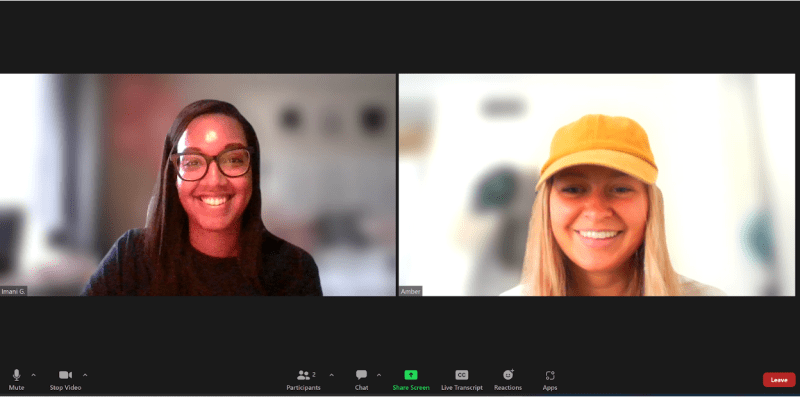








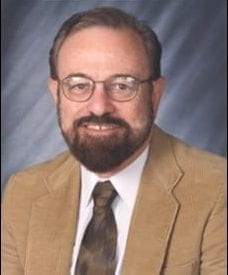











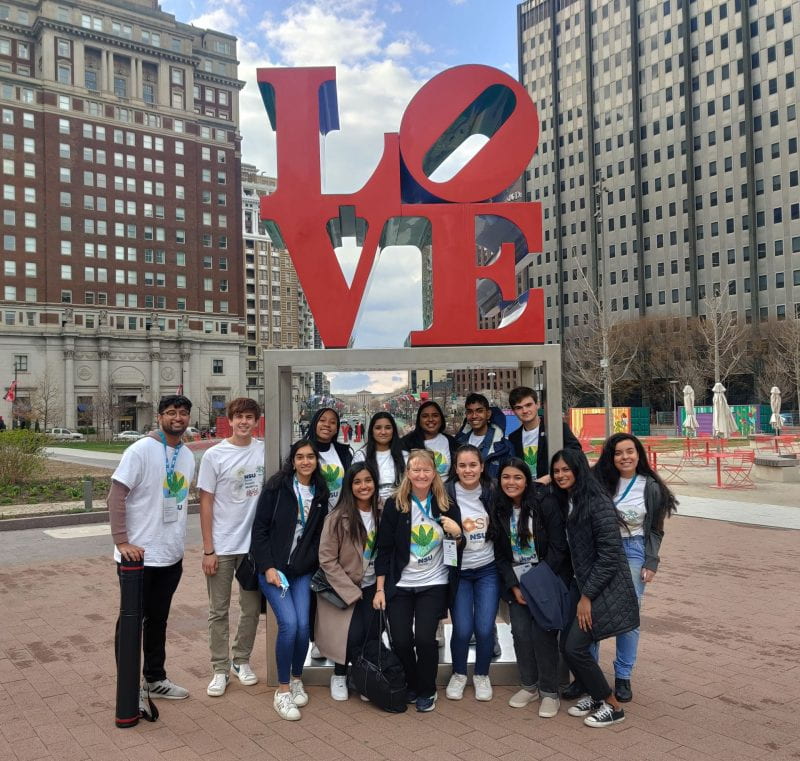
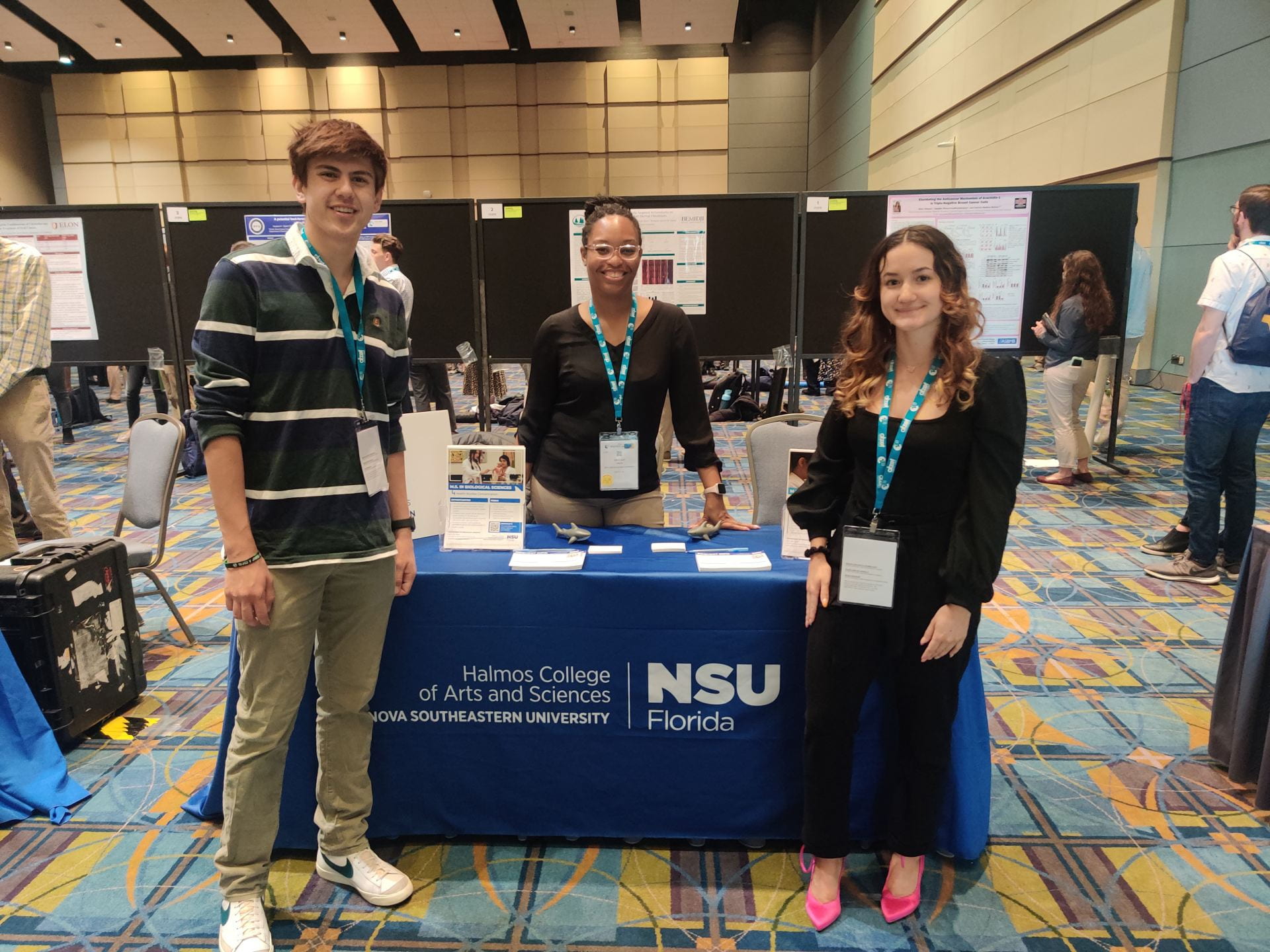
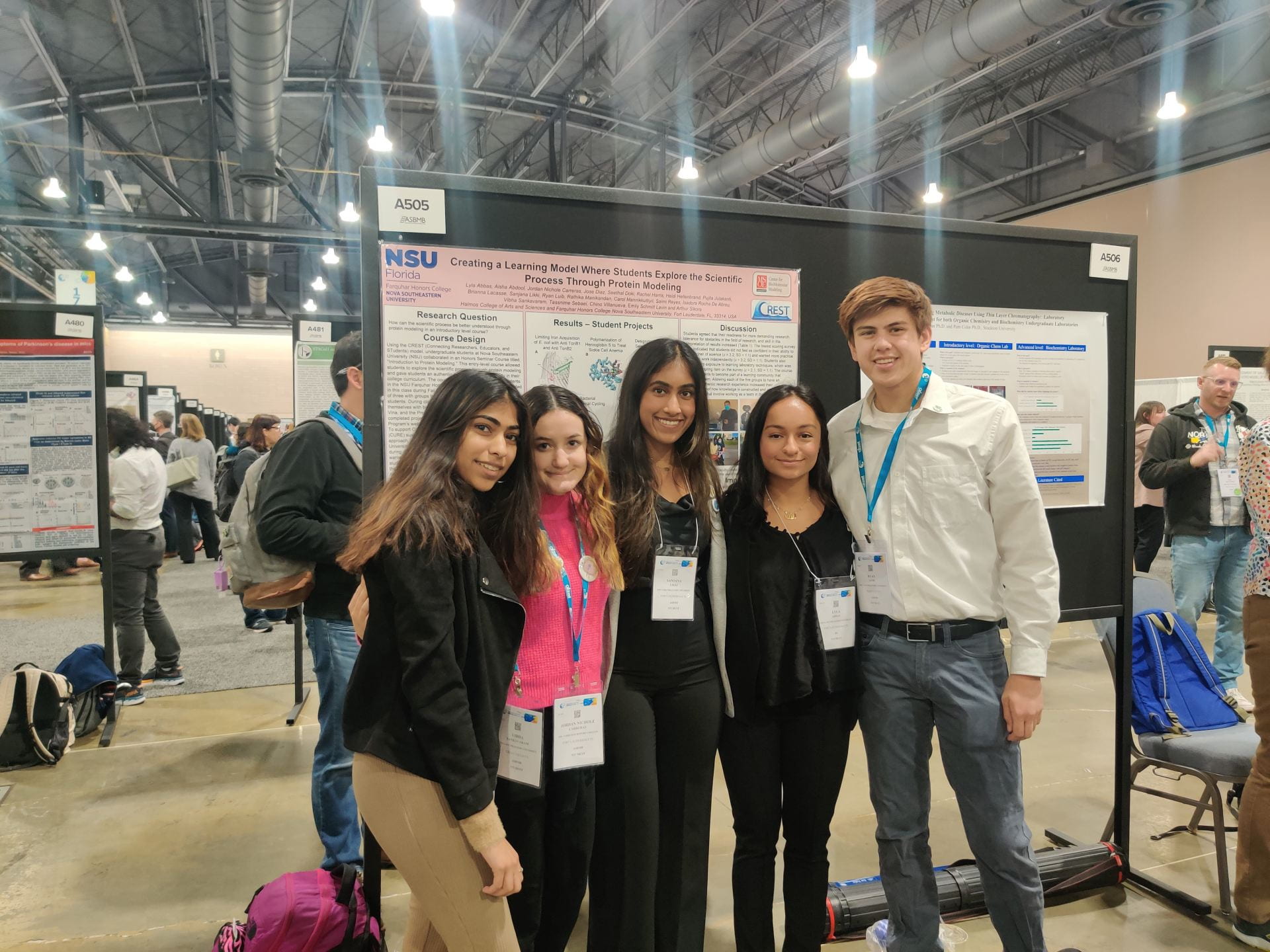
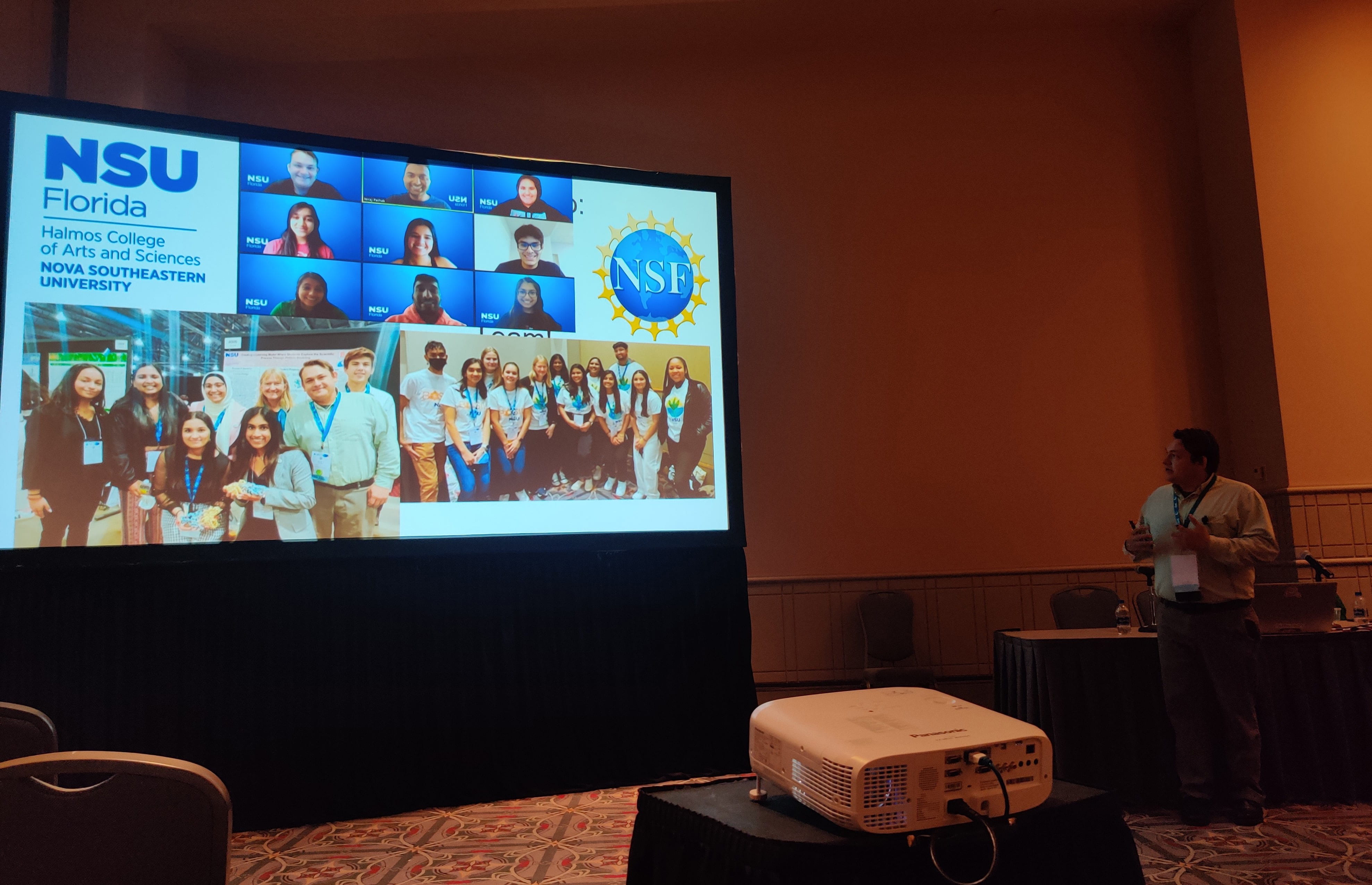



 On Monday, April 4, College of Psychology alumni Caryn Wachsler, Psy.D., and her daughter, Jana Wachsler, Psy.D., visited the College. The purpose of their visit was to introduce Jana Wachsler’s daughter, Emilie, to the school.
On Monday, April 4, College of Psychology alumni Caryn Wachsler, Psy.D., and her daughter, Jana Wachsler, Psy.D., visited the College. The purpose of their visit was to introduce Jana Wachsler’s daughter, Emilie, to the school.